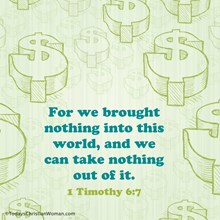Just a Little Bit More
At 22 years old, we brought into marriage one car, one job, and an assortment of secondhand furniture (along with a bedroom set that was a wedding gift from my parents). We weren't poor. (I can remember the way we'd both gasped when, weeks after our engagement, we learned a company was offering to employ my soon-to-be-husband for nearly $30,000!) Still, it was certainly the leanest time of our now 18 years.
Advance nearly two decades. Lean—if it ever could have been called such in a marriage that has never known unemployment—has given way to fat. We have two cars and a house full of furniture that is mostly new. We don't wonder how we'll pay for Christmas; we never worry about medical bills. What we need, we buy. What we want, we can generally afford (except, of course, airfare for our family of seven). Steadily we give more away each year, and yet there continues to be money to squirrel away for retirement and even to save for our children's college education.
I am profoundly grateful. But something surprises me about the powerlessness of this plenty: It hasn't hushed the voices of fear and nagging discontent.
Woes of the rich
I am surprised by their discontent. By "their" I mean the mothers and fathers in front of my children's school, blowing kisses through the open door of their Mercedes.
At social functions, they spin tales of woe that would, in other places, sound like windfall. "The interior designer I'd hired to do our chalet at Mont Tremblant is so fabulous. But I'm just not sure we can afford to fly her to Toronto every month to do the house here." They lament that they won't be traveling anywhere warm this winter holiday because they're building a multi-million dollar home. "But I told the kids, would you rather go to the Caribbean or have a pool?" They can't decide whether to level the house they'd renovated several years ago and rebuild or to buy an existing home. "If we build again, we won't do the Italian bath fixtures like we did in this house. It's just too difficult to find replacement parts." For these surgeons and lawyers, bankers, and entrepreneurs, their every material wish is, quite simply, their command.
It seems they can effortlessly afford the private school tuition, the luxury cars, and the coveted $50,000 club membership (for which one must spend two years on a waiting list). They keep second homes, employ small staffs, and spend the March holiday in Turks and Caicos (a place I've only recently learned to locate on the map). The parents of my children's school friends secure comforts and conveniences for themselves that, before moving to Toronto three years ago, I hadn't imagined possible.
But they, like me, remain restless.
Money is a cruel master
When asked the question, "How much money is enough?" it's fabled that early twentieth-century oil tycoon John D. Rockefeller answered, "Just a little bit more." We're prone to agree with him: just a little bit more to spend, to save, and even a little bit more in order that we might give generously. But more, as the Bible pictures it, is a desert mirage to the dying woman and man. The writer of Ecclesiastes has sane advice to offer each of us living in this material world—where want, no matter our income, is endlessly elastic and more is eternally elusive.
The wise king of ancient Israel (himself a man rich in servants, fields, and flocks) detailed the perils awaiting those craving more. Using the wind as his metaphor, he described their lunacy: "All their hard work is for nothing— like working for the wind" (Ecclesiastes 5:16). The more we think money can provide eludes capture. With more money, there are only more mouths to feed (verse 11) and more worries of catastrophic loss (verse 12). Yes, money brings more, just not the more we expect of it. Worse, more does nothing to stave off the grim threat of our mortality. Unrelentingly, final breaths do something sudden and irrevocable to the personal value of financial portfolios (verse 15). More is bottomless and hollow, never securing our life as we think it can.
Jesus spent a lot of his airtime talking about money. In fact, he talked more about money than about prayer. It's as if he recognized that, by virtue of human sinfulness, we come hardwired with all the wrong thoughts about money: that more will satisfy, that more will stabilize what is ultimately fragile about our lives, that a little bit more will be all that's required to begin living freely and happily. He knew the poverty of discontent and fear into which we are each born—and he understood we'd try to escape the terrors of instability and insecurity by pledging our allegiance to more, that cruel master, who could never provide and protect as promised.
"No one can serve two masters," Jesus declared. "You cannot serve both God and money" (Matthew 6:24). It was Jesus who came to rescue us from this heart-wrecking appetite for more, insisting that there is a better Master—a Father, a good Father. And although our lives are fragile—nearly as fragile as those of the birds and the flowers (verses 26–30)—this heavenly Father feeds and clothes us as he feeds and clothes them. He tends creation with care, and his protection and provision are not the promissory note of wealth. Trust this Father, bids Jesus. He knows your needs and has the will and resources to supply. "That is why I tell you not to worry about your everyday life" (verse 25).
Jesus splices open greed and reveals its true identity: fear. Greed is about fear. Greed operates in a Godless universe where human beings, thinking they've been orphaned by their heavenly Father, learn to survive by their wits. When God is made into a distant, disinterested Father and human beings believe they cannot bank on his love, they turn elsewhere.
But if greed is related most deeply to fear, then neither having money nor lacking money is prevention against the ancient vice. Having, we fear losing; as Jesus reminds us, moth and rust destroy, "thieves break in and steal" (verses 19–20). Lacking, we fear . . . well, utility bills, co-pays, and furnace repairs. Greed won't be undone by more money but only by more trust.
From greed to generosity
It's impossible to measure the degree of trust I have in my heavenly Father. If in need and in want, my needs are amply supplied, do I recognize my Father as the giver of all the good? Or do I, somewhere deep and subconscious, credit myself? And would I, if visited by unexpected financial crisis, keep faith?
Jesus' words read like an indictment: "Can all your worries add a single moment to your life?" (verse 27). With money for paying the mortgage, I can be lulled into a peace I confuse with trust. But time? No, there is never enough time! With five children, a writing life, and a part-time staff position in my church (not to mention groceries and date night and obligatory phone calls to my mom), I end every day in the red. I use money to buy more hours and minutes, but still, I'm a woman, parched and dry, stretching out my hands in the desert to catch the wind. I want a little bit more.
This serves to remind me: We are all guilty and greedy, wanting a little bit more of whatever it is that chronically runs a shortfall in our lives. But shortages and shortfalls, wherever we recognize them, invite us beyond fear into trust. There is a Father, a good Father, whose means are sufficient for our every need. "God is able to make all grace abound to you, so that having sufficiency in all things at all times, you may abound in every good work," (2 Corinthians 9:8, esv). While there may never be more, in God's economy, there is always enough.
This lesson of enough is not easily learned. In fact, I may know of only one way of learning it: generosity. Give away money. Give away time. Remembering the man with the surplus in the Gospel of Luke ("Fool! This night your soul is required of you, and the things you have prepared, whose will they be?" Luke 12:21, esv), I consider how reflexive hoarding and miserliness can be. So I give. And give more.
"Give until it hurts," a pastor once advised. Incrementally, I try, by God's sufficient grace, to learn to part with some of the very necessary resources I think I need for making my life secure and stable, even happy. And as I give, I find a Father I can afford to trust.
Subscribe to TCW at this link, and sign up for our free e-newsletter to become part of a community of women striving to love God and live fearlessly in the grit of everyday life.
Jen Pollock Michel lives in Toronto with her husband and five children. She writes regularly for the devotional publication, Today in the Word, and Christianity Today's Her.meneutics. She is publishing a book about desire with InterVarsity Press later this year. Connect with her at www.JenPollockMichel.com or on Twitter @Jenpmichel.
Read more articles that highlight writing by Christian women at ChristianityToday.com/Women
 Read These Next
Read These Next


 Bankrupt!Tim and Melinda Inman thought they'd done everything right. So how did they end up in court, declaring themselves unable to pay their debts?
Bankrupt!Tim and Melinda Inman thought they'd done everything right. So how did they end up in court, declaring themselves unable to pay their debts?
 9 Secrets Pastors KeepWhat your pastor isn’t telling you
9 Secrets Pastors KeepWhat your pastor isn’t telling you








 Homepage
Homepage